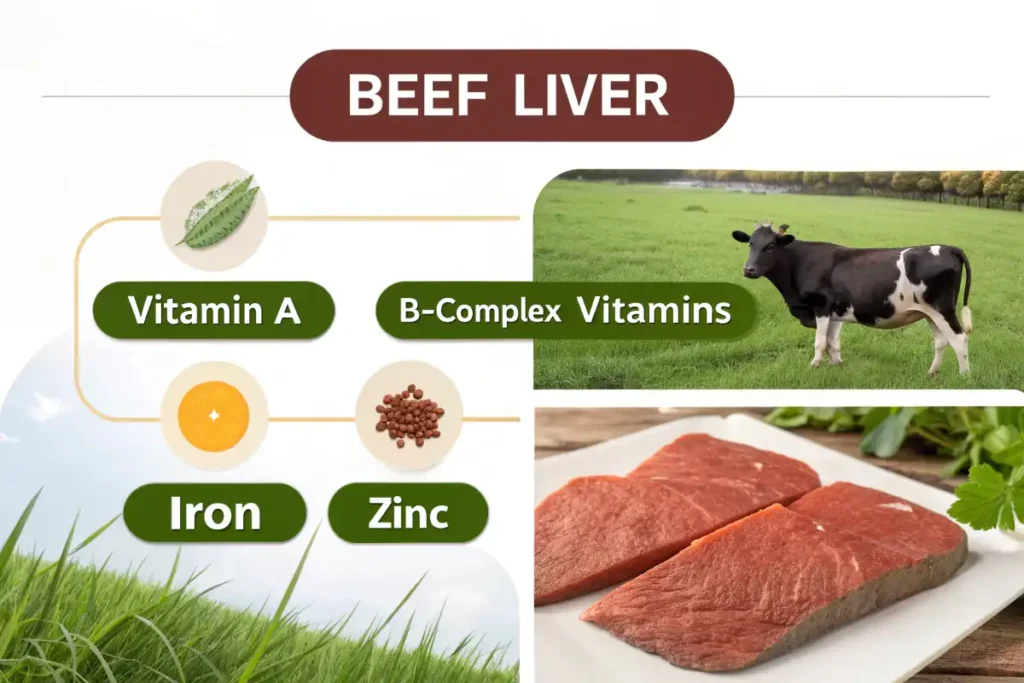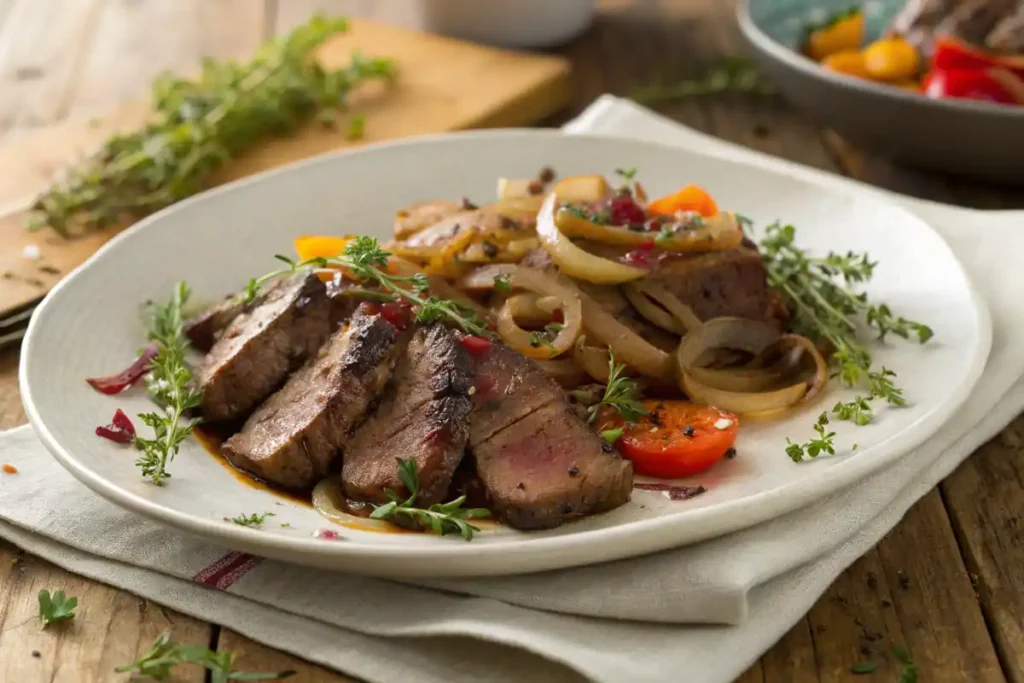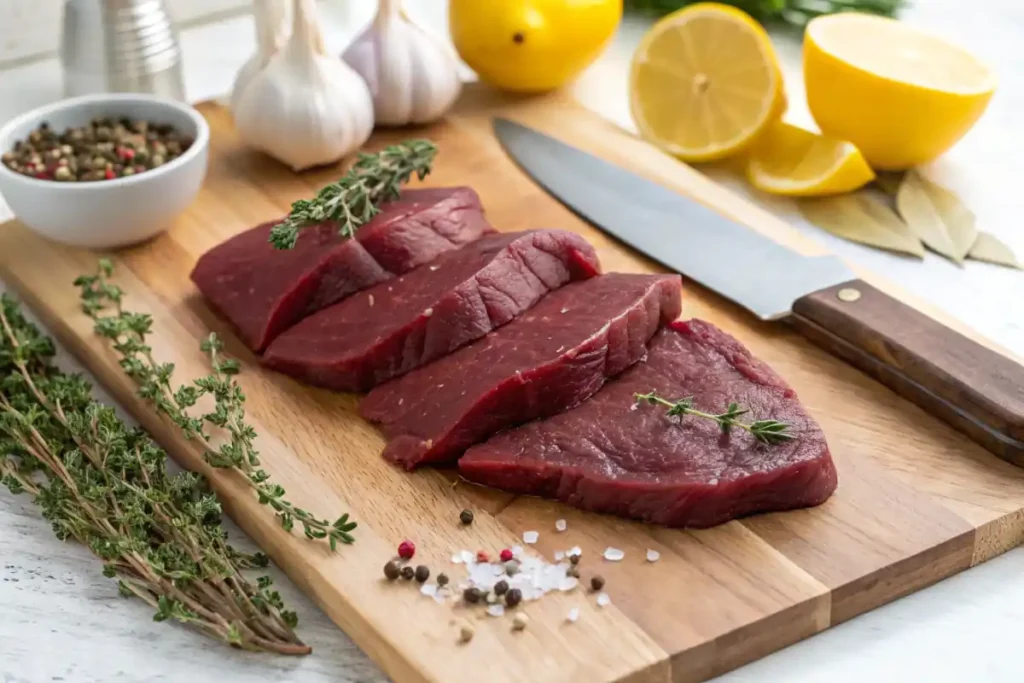Unlock the Health Benefits of Beef Liver: A Nutritional Guide
Table of Contents
Growing up, my grandmother always praised liver as a secret weapon for vitality. She’d serve it with a knowing smile, insisting it was the key to robust health. Back then, I didn’t understand. Now, I realize she was ahead of her time in recognizing beef liver as a true nutrient-dense foods powerhouse.
Modern nutrition science has caught up with traditional wisdom, revealing beef liver as a remarkable superfood liver that can transform your health. Unlike typical muscle meats, this organ contains an extraordinary concentration of essential nutrients that support your body’s most critical functions.
Your journey into understanding the incredible potential of beef liver starts here. We’ll explore how this often-overlooked food can become a game-changer in your nutritional strategy, offering benefits that go far beyond typical dietary recommendations.
Key Takeaways
- Beef liver is an exceptional source of concentrated nutrition
- Traditional food wisdom is increasingly validated by modern research
- Nutrient-dense foods like liver can significantly impact overall health
- Understanding liver’s nutritional profile helps make informed dietary choices
- Small quantities of beef liver can provide substantial health benefits
Why Beef Liver Is Nature’s Most Potent Superfood
Beef liver is a nutritional powerhouse among traditional foods. It offers a unique mix of nutrients that few other organ meats can match. Your journey into understanding this remarkable superfood starts with exploring its rich history and scientific significance.
Throughout human history, beef offal has been treasured by cultures worldwide as a critical source of nutrition. Ancient societies recognized the incredible value of organ meats long before modern nutritional science emerged. Hunter-gatherer communities prized liver as a vital food source, understanding instinctively its life-sustaining properties.
Understanding the Historical Significance of Liver Consumption
- Indigenous populations in Arctic regions relied heavily on organ meats for survival
- Traditional European cuisines incorporated liver into numerous delicacies
- Native American tribes considered liver a sacred and healing food
“Liver was considered more valuable than muscle meat in many traditional diets” – Nutritional Anthropology Research
Modern Science Validates Traditional Wisdom
Contemporary research has scientifically confirmed what traditional cultures knew intuitively. Beef liver contains an unprecedented concentration of nutrients that support optimal human health. Its nutrient density surpasses most other foods, providing a comprehensive array of vitamins, minerals, and essential compounds.
- Highest known natural source of vitamin A
- Exceptional B-vitamin complex
- Rich in bioavailable iron
- Contains rare trace minerals
Your understanding of beef liver transforms from a simple organ meat to a true nutritional marvel. It bridges ancient wisdom with cutting-edge scientific research.
The Complete Nutritional Profile of Beef Liver

Beef liver is a top choice for those looking for a nutrient-rich food. It’s packed with nutrients that make it stand out. This organ meat is a game-changer for anyone looking to eat healthier.
The nutritional makeup of beef liver is impressive. Let’s dive into its main components:
- Protein content: About 20 grams per 100-gram serving
- Fat: Low in saturated fat, making it a lean protein source
- Calorie density: Around 135 calories per 100 grams
Beef liver is special because of its micronutrients. This superfood has high levels of essential vitamins and minerals. It’s a natural storage for vital nutrients, making it a great addition to your diet.
“Beef liver is nature’s most potent multivitamin, providing more nutrients per ounce than most supplements,” nutrition experts often emphasize.
Compared to regular muscle meats, beef liver has more:
- Vitamin A
- B-complex vitamins
- Iron
- Zinc
- Copper
For those aiming for the best nutrition, adding beef liver to your meals can be a big win. Its unique mix of nutrients supports many body functions. It offers nutritional support that few foods can match.
Essential Vitamins and Minerals Found in Beef Liver
Beef liver is a nutritional powerhouse. It’s packed with essential vitamins and minerals that boost your health. This food is a concentrated source of key nutrients for overall wellness.
Vitamin A and Retinol Benefits
Beef liver gives your body a big boost with its vitamin A. A single serving has over 700% of the daily recommended amount of retinol. This vitamin is crucial for:
- Optimal eye health
- Immune system function
- Skin regeneration
- Cellular growth and development
B-Complex Vitamins and Iron Content
Beef liver is a nutritional champion for B-complex vitamins. It offers a mix of B vitamins important for energy and metabolism. Its iron content is also high, helping prevent anemia and supporting red blood cells.
Trace Minerals and Coenzymes
Beef liver also has trace minerals and coenzymes. Copper, selenium, and zinc work together to support the body. They help with:
- Enzyme production
- Metabolic processes
- Immune system support
- Cellular protection
“Nature’s most complete multivitamin comes not from a bottle, but from beef liver” – Nutrition Experts
How Beef Liver Supports Overall Health and Wellness
Beef liver is a superfood that greatly benefits your body. It’s packed with nutrients that support your health and wellness.
Your immune system gets a big boost from beef liver. It’s full of nutrients that help your body fight off sickness and heal faster.
- Boosting white blood cell production
- Supporting natural defense mechanisms
- Enhancing cellular regeneration
Beef liver also helps your brain. It has vitamin B12 and essential fatty acids that improve memory and mental focus.
“Consuming beef liver can be compared to taking a natural multivitamin directly from nature’s pharmacy.” – Nutritional Research Institute
Beef liver also boosts your energy. It has high-quality protein and minerals that fight fatigue and support your body’s functions. Athletes and active people often notice better stamina and quicker recovery.
- Supports muscle recovery
- Enhances metabolic efficiency
- Provides sustained energy
Beef liver is a nutritional treasure. It supports many bodily functions, making it a great addition to a healthy diet.

Choosing the Best Quality Beef Liver Sources
When picking beef liver, quality is crucial. Your choice affects the nutritional value and health benefits. Knowing your options helps you make a smart choice.
Grass-Fed vs. Conventional Liver
Grass-fed beef liver is the top pick for health lovers. It beats conventional liver in many ways:
- Higher nutrient density
- Better omega-3 fatty acid profile
- Lower potential chemical contamination
Grass-fed beef liver comes from cows eating natural grass. This means more nutrients in the meat. It’s a healthier choice for your diet.
Fresh vs. Frozen Options
You’ll find both fresh and frozen beef liver. Each has its own benefits:
- Fresh liver: Great for cooking right away
- Frozen liver: Easy to store for later
- Frozen liver keeps its nutrients well if frozen right
Supplement Forms Available
If eating whole liver isn’t your thing, supplements are an option. Grass-fed beef liver capsules are a handy way to get these nutrients without eating liver.
“Quality is key when selecting beef liver – always prioritize sourcing from reputable, grass-fed sources.”
Simple Ways to Include Beef Liver in Your Diet
Adding beef liver to your meals is easy. It’s packed with nutrients that can boost your diet. Whether you’re new to cooking or experienced, these recipes will make you love beef liver.
- Blend liver into homemade meatballs for a subtle flavor boost
- Create smooth pâté as an appetizer or spread
- Chop finely and mix into ground beef dishes
- Slice thinly and pan-fry with onions for a classic preparation
If you’re new to beef liver, start with small amounts. Experts say 2-4 ounces a week is best. This way, you get the most nutrients without feeling overwhelmed.
“Liver is nature’s most potent multivitamin, packed with essential nutrients in their most bioavailable form.” – Nutrition Experts
Quick and tasty beef liver recipes can make it more appealing. Try marinating it in milk or buttermilk for 30 minutes. This softens the flavor. Adding herbs like thyme, rosemary, and sage can also enhance the taste.
- Choose high-quality, grass-fed beef liver
- Trim any visible membranes
- Cook quickly at high heat to prevent toughness
- Pair with caramelized onions for enhanced flavor
Exploring beef liver recipes can be both tasty and healthy. With these tips, you’ll find it easy to add this traditional food to your meals.
Addressing Common Concerns About Eating Liver
Many people wonder about the safety of eating beef liver. Knowing the facts can help you make better food choices. This way, you can enjoy the health benefits of this powerful food.
Safety Considerations for Liver Consumption
Beef liver is packed with nutrients, but some worry about toxins. The liver filters toxins, leading to safety myths. But, a healthy beef liver from a good source is safe in small amounts.
- Choose liver from grass-fed, organic sources
- Limit consumption to 3-4 ounces per week
- Purchase from reputable farmers or butchers
Understanding Mercury and Nutritional Risks
Beef liver usually has little mercury. The important thing is to pick high-quality organ meats. Pregnant women and people with health issues should talk to doctors before eating beef liver.
“Quality matters more than quantity when consuming nutrient-rich organ meats.” – Nutritional Expert
Recommended Serving Guidelines
Experts say to eat beef liver in moderation to avoid too much vitamin A. Aim for 2-4 ounces a week. This way, you get the good stuff without too much.
- Start with small portions
- Monitor your body’s response
- Rotate with other protein sources
By knowing these tips, you can safely add beef liver to your meals.
Tips for Cooking and Preparing Beef Liver

Turning beef offal into a tasty dish is easy with the right steps. Many people avoid beef liver because of its strong taste. But, with the right prep, it can be a real treat.
Choose high-quality beef liver from grass-fed animals. Soak it in milk or buttermilk for 30-60 minutes before cooking. This step softens the meat and reduces the strong taste.
- Slice the liver thinly (about 1/4 inch thick) for even cooking
- Pat the liver dry with paper towels before seasoning
- Use minimal cooking time to prevent toughness
Seasoning is crucial when cooking beef liver. Try a mix of herbs and spices like:
- Garlic powder
- Smoked paprika
- Fresh thyme
- Black pepper
Quick cooking is best for beef liver. Pan-fry it on high heat for 2-3 minutes on each side. This makes it crispy outside and soft inside. Serve it with caramelized onions for extra flavor.
“The secret to great beef liver is quick cooking and bold seasoning” – Professional Chef
If you’re new to beef liver, start with small amounts. Try different cooking ways until you find what you like best.
Conclusion
Beef liver is a standout food, rich in nutrients. It connects old dietary wisdom with new science. This journey shows its health benefits, full of vitamins and minerals for wellness.
Beef liver is a nutrient powerhouse. It boosts your diet with vitamins A, B-complex, and minerals. Adding it to your meals is a smart choice for health.
Beef liver benefits are clear, whether in dishes or supplements. It’s a natural source of energy and immune support. It’s a key to better health.
Choosing beef liver is more than food. It’s a way to nourish your body with nature’s best. Start your journey to better nutrition with beef liver.
FAQ
Is beef liver safe to eat regularly?
Yes, beef liver is safe when eaten in moderation. Most experts say to eat it 1-2 times a week. Each serving should be about 3-4 ounces. But, pregnant women and people with certain health issues should talk to their doctor first because of its high vitamin A.
What makes grass-fed beef liver different from conventional liver?
Grass-fed beef liver has more nutrients than regular liver. It has better omega-3 fatty acids, vitamins, and minerals. It’s also from cows raised in healthier environments. This makes grass-fed liver more nutritious and of better quality.
How can I make beef liver taste better?
To make beef liver taste better, marinate it in milk or buttermilk. This can soften its strong taste. Try sautéing it with onions and using garlic, thyme, or bacon for flavor. Slice it thinly and cook it quickly to avoid a tough texture.
Can I eat beef liver if I’m anemic?
Yes, beef liver is great for fighting anemia because of its high iron. It has heme iron, which the body absorbs better than plant iron. Liver also has vitamin B12, which helps make red blood cells and prevent anemia.
“Delicious Reviews: Tasting Every Bite of Our Recipe Creations!”
There are no reviews yet. Be the first one to write one.

